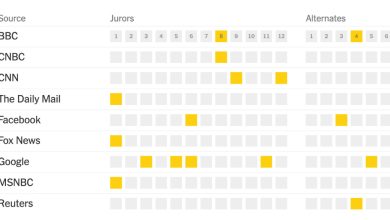Rex Heuermann Faces Fourth Murder Charge in Gilgo Beach Serial Killings

Rex Heuermann, whom prosecutors charged in July as the Gilgo Beach serial killer, was charged Tuesday morning in connection with a fourth murder.
Mr. Heuermann, 60, was previously charged in the killings of three of the four women whose remains were found on the Long Island oceanfront in 2010 bound in similar fashion with burlap, belts and tape.
In July, prosecutors called Mr. Heuermann the prime suspect in the murder of the fourth victim, Maureen Brainard-Barnes, 25, of Norwich, Conn., who disappeared in 2007, becoming the first of the so-called Gilgo Four.
But charges in her killing were delayed pending DNA test results on a hair recovered from her remains, so the grand jury in the case continued its work.
After the four bodies were discovered along a stretch of oceanfront parkway, six more sets of remains were found. The circumstances around those deaths are still being investigated.
Mr. Heuermann was first identified as a suspect in the killings in early 2022, shortly after a new multiagency task force was formed to investigate the case.
Investigators say he made numerous calls and texts to Ms. Brainard-Barnes just before her disappearance.
Prosecutors say they have records of damning internet searches made by Mr. Heuermann, as well as mobile phone location data corresponding to his home in Massapequa Park and his architectural consulting office in Midtown Manhattan.
The DNA evidence connecting him to the murders includes several stray hairs that belonged to his wife, Asa Ellerup, found on the bodies, and a male hair that corresponds to a genetic sample taken from pizza crusts Mr. Heuermann discarded outside his office, prosecutors say.
Investigators say Ms. Brainard-Barnes’ remains, likely the most decomposed of the four sets, were bound by three belts.
A stray female hair was found near one belt, and another belt had a distinctive buckle bearing the initials W.H., which the authorities said in 2020 could have belonged to Mr. Heuermann’s father.
Mr. Heuermann’s defense lawyer, Michael Brown, has cited weaknesses in the mitochondrial DNA testing used by investigators. The technology does not prove a link to a specific person, but instead eliminates suspects by ruling out others.
Mr. Heuermann could be among a group of “thousands and thousands” of suspects, considering the local population, Mr. Brown has argued.




